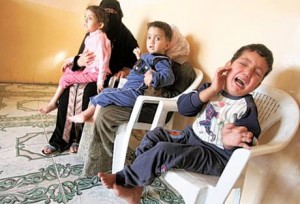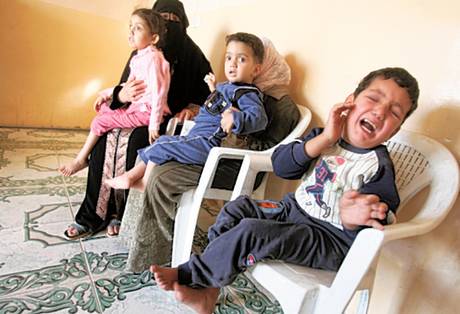 After being asked to give his take on a recent report about the human costs of attacking Iran’s nuclear facilities, a prominent commentator on US-Iran relations said it was an “inexact science” and declined further comment even though he called the project a worthy endeavor. While the idea that inflicting physical damage on a nuclear site would cause serious harm to surrounding biological entities seems indisputable, at least the after-effects of the 2003 US-led invasion of Iraq tragically continues to serve as a case study for the impact a prolonged war with Iran — required if the goal is to set back Iran’s nuclear program by more than a few years — would have on the human population. According to a new study first reported on by the Independent, there has been a significant rise in Iraqi birth defects in cities that were hard-hit by US-led forces during the war:
After being asked to give his take on a recent report about the human costs of attacking Iran’s nuclear facilities, a prominent commentator on US-Iran relations said it was an “inexact science” and declined further comment even though he called the project a worthy endeavor. While the idea that inflicting physical damage on a nuclear site would cause serious harm to surrounding biological entities seems indisputable, at least the after-effects of the 2003 US-led invasion of Iraq tragically continues to serve as a case study for the impact a prolonged war with Iran — required if the goal is to set back Iran’s nuclear program by more than a few years — would have on the human population. According to a new study first reported on by the Independent, there has been a significant rise in Iraqi birth defects in cities that were hard-hit by US-led forces during the war:
The latest study found that in Fallujah, more than half of all babies surveyed were born with a birth defect between 2007 and 2010. Before the siege, this figure was more like one in 10. Prior to the turn of the millennium, fewer than 2 per cent of babies were born with a defect. More than 45 per cent of all pregnancies surveyed ended in miscarriage in the two years after 2004, up from only 10 per cent before the bombing. Between 2007 and 2010, one in six of all pregnancies ended in miscarriage.
The new research, which looked at the health histories of 56 families in Fallujah, also examined births in Basra, in southern Iraq, attacked by British forces in 2003. Researchers found more than 20 babies out of 1,000 were born with defects in Al Basrah Maternity Hospital in 2003, a number that is 17 times higher than recorded a decade previously. In the past seven years, the number of malformed babies born increased by more than 60 per cent; 37 out of every 1,000 are now born with defects.
The US response:
A US Defense Department spokesperson said: “We are not aware of any official reports indicating an increase in birth defects in Al Basrah or Fallujah that may be related to exposure to the metals contained in munitions used by the US or coalition partners. We always take very seriously public health concerns about any population now living in a combat theatre. Unexploded ordnance, including improvised explosive devises, are a recognised hazard.”
But a series of studies have suggested links between the bombardments and a rise in Iraqi birth defects:
Their preliminary findings, in 2010, prompted a World Health Organisation inquiry into the prevalence of birth defects in the area. The WHO’s report, out next month, is widely expected to show an increase in birth defects after the conflict. It has looked at nine “high-risk” areas in Iraq, including Fallujah and Basra. Where high prevalence is found, the WHO is expected to call for additional studies to pinpoint precise causes.






And we Americans think of ourselves as humanitarians.
And after we destroy Iran’s economy, we’ll probably bomb their nuclear facilities and release more devastation.